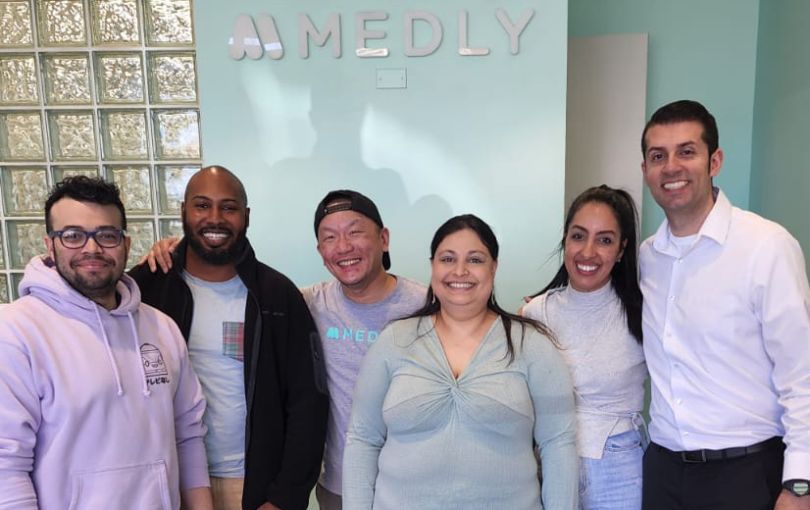Salmaa Elshanshory started working at Uber in February 2015, just months before the company would make history by becoming the most valuable startup in the world. Just five months later, Uber was valued at $51 billion after multiple funding rounds. Inside the company, Elshanshory had a front-row seat to the growth that came with that record-breaking milestone.
“Uber wasn’t a disrupter in that it introduced an entirely new concept by paying someone to get you from point A to B,” she said. “Uber was a disrupter because it introduced a new and elevated experience to get from point A to B. It was a sticky product because it was the experience you didn’t realize you needed.”
Now having made the move from transportation into healthcare by joining the leadership team at Medly, Elshanshory sees many exciting parallels to the growth she witnessed at Uber.
In her view, Medly mirrors other disruptive tech companies by reimagining what the pharmacy experience looks like in an industry that is overdue for an upgrade, offering a curated experience through an omnichannel experience. “It’s what Sephora is to makeup and IKEA to retail furniture. Before using these services, consumers didn’t know the experience or products they deserved,” said Elshanshory.
What does Medly do?
People struggling with healthcare are often extra vulnerable, making the work Elshanshory and the team are doing even more impactful. “It’s reframing an experience many of us dread or find cumbersome and turning into something we can look forward to. This means your medication comes to you whenever or wherever you need it — that you’re able to get the dedicated support to help you with your health and wellness needs and achieve better outcomes through a holistic approach,” she said.
Elshanshory oversees scaling Medly’s physical footprint as the vice president of market expansion, where she helps build and acquire new retail locations across the U.S. Her day-to-day consists of everything from helping manage end-to-end physical transformations to operational setup, working across critical department stakeholders to accelerate and elevate each market launch.
Medly is more than just a job for Elshanshory. She has a personal connection to the work: She has written openly about her own challenging health journey with a rare and little-understood illness, which left her feeling “helpless and frustrated.” She is channeling her fire into revitalizing one aspect of the healthcare industry and ultimately hopes to help others.
“I’m excited about the importance this decade is placing on health, and that companies like Medly are tackling it across the many layers that have made it complex and inefficient,” she said.
Built In NYC connected with Elshanshory for her take on why people should get in on the ground floor of a company primed for takeoff — and why “healthcare is an industry worth learning.”
What are the specific markers that indicate Medly is on a rocketship growth trajectory similar to what you experienced at Uber?
First and foremost, a visionary leader. There are not enough people to execute all of our CEO’s ideas, which is a great problem to have. Marg Patel always has a different way to look at the same problem and a new idea that drives our business to a further destination. Our meetings take me back to our companywide Uber meetings with then-CEO Travis Kalanick, where you left feeling inspired about the problems you were not only solving today but going to solve tomorrow. It also helps that the person leading this effort is equipped to solve the problems of this industry as more than just a businessman but a doctor.
The second is the product-market fit. It’s the moments outside of the doctor’s office that matter most in a healthcare journey. Medly is addressing the first and last mile to health and wellness by tackling pain points and opportunities along the way. Each location is more than a store; it’s a hub that services an entire community — whether a customer is walking in or lives 30 miles away, Medly is a tap away. We’re building a business model that accounts for these layers. We’re widening the definition of our customer base. Our customers are patients, providers, payors and much more — they are you.
Third, we’re hyper-focused on building better. Startups are an iterative process, but those that make it know how to — and have a foundation — to iterate the fastest. Medly started as a pharmacy, expanded to become a tech company and now is building an end-to-end retail experience. The way in which we have executed this vision has come with some course-correcting and honest introspective conversations. There is a bias for action, assessing tradeoffs and owning outcomes, knowing it might be a steep learning curve. One step back, two steps forward. That’s a critical path to success.

How does your work at Medly align with your passion?
I decided I wanted to be on the other side of the problem and pain points in healthcare. I’ve spent years maneuvering the complexities and subpar experiences in my journey to address my own health problems, often feeling helpless and frustrated. My decision to step into the healthcare industry was the culmination of a bunch of small moments, from losing loved ones to Covid-19 to craving re-entering a space with high social impact. Ultimately, I found the right opportunity and though it might not solve my immediate healthcare needs, it allows me to enhance the quality of life of my community, as well as the toolkit to maybe one day be at the front lines of my own wellness journey.
“I decided I wanted to be on the other side of the problem and pain points in healthcare.”
Healthcare can be an intimidating industry to join. What benefits does your background bring? What are some of the biggest challenges?
The biggest challenge is rejection. I’ve been fortunate enough to get to a level in my career where jumping into the next job opportunity has been easy with recruiters engaging continuously. But as I ventured into the healthcare industry, I found myself taking a lead in applying to these roles and more pressed on my lack of healthcare experience. It ultimately cost me some opportunities; I was being told I had the perfect background except that I had no healthcare experience. I ultimately found companies that saw the upside of my experience, but it reminded me of the difficulties I faced jumping from nongovernmental organizations into the private sector.
There’s also a steep learning curve; this isn’t an industry you can understand overnight. It’s complex and just when you think you’ve learned it, there is another layer you never knew existed. But it’s so rewarding — it’s an industry that will impact all of us at one point or another in our lives.
What’s your proudest accomplishment at Medly? What are you most excited about tackling next?
I’ve been incredibly fortunate to be able to leverage my skill sets across the company. What I’m most proud of is leading and developing a companywide goal-setting structure. This has entailed defining our North Star for years to come with the executive team, formulating a framework that balances out bottom-up feedback and top-down direction, and driving rigor and organization in setting initiatives with department leadership. It isn’t a linear process as we continue to iterate and prioritize this, but it is a foundation we are building on. This sets us up for a stronger future by staying focused on what needs to be accomplished in the present and being accountable for it.
As for what I’m most excited about, it’s defining and pressure testing the basics. That means building the gold practices and playbooks that allow us to move even more quickly in 2023. This also means ruthless prioritization — every startup’s uphill battle.
“It’s complex and just when you think you’ve learned it, there is another layer you never knew existed.”
The company brings together a distinct set of talents. How do you introduce technologists into the daily work of retailers and healthcare professionals?
The average age of the U.S. workforce is about 42 years old. Meanwhile, it hovers around 30 years old in the tech space. The reality is that tech companies often don’t represent the broader customer base they serve. And I’ve operated in that bubble that values meritocracy over years of experience, and I love that! It’s how I got to where I am today. But as I work with people who have decades of experience under their belts, I’ve also learned that we need to value that just as much. Nothing can replace working with healthcare professionals and retailers who have seen the trends within the industry and understand the nuances that take years to learn. Coupling that with people — like myself — who learn quickly can hypercharge a company’s growth. It’s the best of both worlds.
Healthtech is a hot market after the pandemic revealed some of its biggest issues. What sets Medly apart from its competitors?
I’m excited about competitors in this space. The pie is big enough, but if I had to be a betting woman, I’d say Medly will own the bigger part of that pie in years to come. We are offering elevated services that come with specialty pharmacies and curated health and wellness products and experiences. We are partnering across the healthcare value chain as we prioritize the best customer experience — this is our core differentiator. It comes down to us being a company that was designed with healthcare needs in mind, not business.






